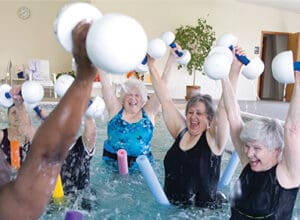
Assessing Your Parents’ Needs and Capabilities
As your parents age, it’s essential to have open and honest conversations about their current abilities and future needs. Assess their physical, cognitive, and emotional well-being to determine the level of support they require. Consider their daily routines, mobility, medication management, and any existing health conditions. This will help you develop a comprehensive plan to ensure their independence and safety.
Begin by candidly discussing their preferences and concerns with your parents. Encourage them to be involved in decision-making, as their input and consent are crucial. Understand their desires to maintain their autonomy and make adjustments accordingly. Remember, the goal is to empower them to live independently for as long as possible.
Creating a Safe and Accessible Home Environment
Ensuring your parents’ home is safe and accessible supports their independent living. Evaluate the property, identifying potential hazards or areas requiring modifications.
Consider adding bathroom grab bars and non-slip flooring, and ensure adequate lighting throughout the home—reposition furniture to form clear pathways and remove tripping hazards. Explore installing assistive technologies, such as motion-activated lighting, smart home devices, and emergency alert systems, to enhance their safety and independence.
Work closely with your parents to understand their preferences and incorporate their feedback into the home modifications. Respect their independence and include them in the decision-making process. Gradual changes that accommodate their needs and preferences will help them feel more comfortable and secure in their home.
Assisting with Daily Activities and Personal Care
As your parents’ needs evolve, you may need to assist with various daily activities and personal care tasks. This could involve help with bathing, dressing, grooming, meal preparation, and household chores.
Approach these tasks with patience, empathy, and respect for your parents’ dignity. Encourage them to participate as much as possible, fostering their independence and self-worth.
Develop a routine that balances your parents’ preferences and your availability. Communicate openly with them to understand their needs and preferences and make adjustments accordingly. Celebrate their accomplishments and progress, as small victories can significantly boost their morale and confidence.
Promoting Physical and Mental Well-being
Maintaining your parents’ physical and mental well-being is crucial for their overall quality of life and independence. Encourage them to participate in regular physical activity, such as light exercises, walking, or local fitness programs. This can help improve their strength, flexibility, and balance, reducing the risk of falls and promoting overall health.
Additionally, pay attention to their mental and emotional well-being. Encourage social interaction through regular visits, participation in community events, or maintaining connections with friends and family. Engage them in stimulating activities, such as puzzles, games, or intellectual discussions, to keep their minds active.

Ensuring Proper Nutrition and Hydration
Proper nutrition and hydration are important for your parent’s health and well-being. Ensure they have access to a balanced and varied diet that meets their nutritional requirements. Assist them with meal planning, grocery shopping, and meal preparation.
Consider their dietary restrictions, preferences, and special needs due to medical conditions. Provide easy access to water and other fluids throughout the day to encourage them to stay hydrated.
Managing Medications and Healthcare Appointments
Proper medication and healthcare appointment management are crucial for your parents’ well-being. Assist them in keeping track of their medications, including dosages, schedules, and any potential interactions. Develop a system to ensure they take their medications as prescribed, such as using a medication organizer or setting reminders.
Help your parents schedule and attend their healthcare appointments, including regular check-ups, specialist visits, and necessary medical tests or procedures. Accompany them to these appointments whenever possible, and take notes to ensure you understand the instructions and recommendations provided by their healthcare providers.
Providing Emotional Support and Social Engagement
As your parents age, they may face challenges that impact their emotional well-being. Provide a listening ear and offer emotional support, validating their feelings and concerns. Encourage them to share their thoughts and feelings and be there to offer comfort and guidance.
Facilitate social engagement by helping them maintain connections with friends, family, and their community. Assist them in participating in social activities, such as local community events, support groups, or volunteer opportunities. This can help combat feelings of isolation and loneliness, which can significantly affect their mental and emotional health.
Utilizing Technology and Assistive Devices
Embrace the use of technology and assistive devices to enhance your parents’ independence and safety. Explore options such as:
- Medical Alert Systems: These devices allow your parents to quickly call for help in an emergency, providing them with a sense of security and peace of mind.
- Smart Home Devices: To make daily tasks more accessible, utilize voice-activated assistants, remote-controlled lighting, and other smart home technologies.
- Mobility Aids: Consider walkers, canes, or wheelchairs to help your parents maintain mobility and independence.
- Medication Management Apps: Use digital tools to help parents track their medications, set reminders, and manage their healthcare needs.
- Telehealth Services: Explore virtual healthcare options that allow your parents to receive medical care from the comfort of their home.
Seeking Professional Help and Community Resources
Navigating the complexities of supporting your parents’ independent living in Carlsbad may require the assistance of professionals and community resources. Seek the guidance of healthcare providers, social workers, and aging specialists to develop a comprehensive plan that addresses your parents’ needs.
Explore local community resources, such as:
- Senior Centers: These centers often offer various activities, social programs, and support services for older adults.
- Caregiver Support Groups: Joining a support group can provide you with valuable insights, emotional support, and practical advice from others in similar situations.
- Transportation Services: Utilize local transportation options, such as shuttle services or ride-sharing programs, to help your parents maintain their independence and mobility.
By leveraging professional expertise and community resources, you can ensure your parents receive the tailored support they need to thrive in their independent living in Carlsbad.
Conclusion and Final Thoughts
Supporting your parents’ independent living in Carlsbad requires a multifaceted approach that addresses their physical, emotional, and social needs. By implementing these essential tips, you can empower your parents to maintain their autonomy, safety, and well-being.
Remember, the key to success is to be adaptable, patient, and willing to collaborate with your parents, healthcare professionals, and the local community. Embrace the journey and celebrate the small victories along the way, as your parents’ independence and quality of life are the ultimate goals.
If you want personalized support to help your parents maintain their independent living in Carlsbad, consider contacting our team at Carlsbad by the Sea. We can work with you to develop a comprehensive plan that addresses your parents’ unique needs and preferences. Contact us today at (760) 720-4580 to learn more.







